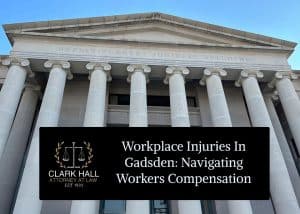## Navigating Workplace Injury Claims in Gadsden: A Comprehensive Guide
In the dynamic landscape of employment in Gadsden, Alabama, workplace injuries are an unfortunate reality. Understanding the intricacies of navigating workers’ compensation claims is vital for employees who sustain injuries on the job. This guide explores workplace injury in Gadsden, providing insight into the legal framework and practical steps for securing rightful compensation. Engaging in this journey requires a thorough understanding of the process, legal advice, and representation to ensure favorable outcomes.
## Understanding Workplace Injury in Gadsden
A workplace injury in Gadsden refers to any physical or psychological harm that employees suffer during the course of their employment. These injuries can range from minor accidents to severe incidents with long-term consequences. Workplace injuries may include slips and falls, overexertion, machinery accidents, or exposure to hazardous substances.
In Gadsden, the Alabama Workers’ Compensation Act governs the rights and responsibilities of employers and employees regarding workplace injuries. This legal framework ensures that employees receive timely medical treatment and compensation for lost wages and other damages related to their injuries. It is crucial for both workers and employers to comprehend these rights and obligations to foster a safe and fair working environment.
Employees must promptly report workplace injuries to their employer to initiate a workers’ compensation claim. Employers have a legal obligation to provide a safe working environment and to act promptly upon receiving injury reports. By understanding these dynamics, employees can protect themselves and ensure that they receive appropriate compensation and care.
## The Significance of Addressing Workplace Injuries
Addressing workplace injuries in Gadsden is crucial for safeguarding employee welfare and maintaining a productive work environment. Failing to properly handle these incidents can lead to significant consequences for both employers and employees, impacting physical well-being, financial health, and workplace morale.
Workplace safety is not just an ethical responsibility but a legal one. Employers are required to comply with safety regulations to prevent injuries and provide appropriate workers’ compensation when they occur. When these obligations are not met, workers face prolonged recovery, financial strain, and potential job loss, affecting their quality of life and future job prospects.
For employers, failing to adequately address workplace injuries can result in legal repercussions, financial losses, and damage to their reputation. A proactive approach to handling such incidents reinforces commitment to employee safety, fostering loyalty and improving overall workplace culture.
## Legal Framework Surrounding Workplace Injury Claims
In Gadsden, the legal framework for workplace injury claims is primarily governed by the Alabama Workers’ Compensation Act. This act outlines the entitlements of injured workers and the responsibilities of employers, ensuring a structured process for addressing workplace injuries.
Under this legal framework, employers must provide insurance coverage for workers’ compensation to secure benefits for injured employees. This coverage encompasses medical expenses, rehabilitation services, and disability compensation for temporary or permanent impairment. The law also delineates the procedures for filing claims, timelines, and dispute resolution mechanisms.
Employees and employers must familiarize themselves with obligations and rights under this act, as deviations or non-compliance can lead to legal conflicts. Employers are mandated to report injuries to their insurance carriers, while employees have the responsibility to notify their employer of any injury promptly to meet legal requirements.
## Real-Life Examples of Workplace Injury in Gadsden
Examining real-life examples helps illustrate the challenges and resolutions faced in workplace injury cases in Gadsden. For instance, consider a manufacturing plant worker who suffered injuries due to inadequate safety measures. The worker navigated the claim process, receiving necessary medical attention and compensation due to adherence to reporting and procedural protocols.
Another example involves a construction worker exposed to harmful chemicals due to improper protective gear. By engaging legal counsel and documenting the unsafe conditions, the worker successfully secured compensation for medical treatment and consequent health issues.
These cases emphasize the necessity for both employees and employers to be vigilant in upholding safety standards and understanding their rights and responsibilities in workers’ compensation claims. Successful claims not only provide financial relief but also promote workplace practices that prevent future accidents.
## Proactive Steps for Handling Workplace Injuries
Taking proactive steps can significantly influence the outcome of a workplace injury claim, ensuring that workers receive the benefits they are entitled to under the law. First, promptly reporting the injury to the employer is crucial, as it initiates the compensation process and demonstrates good faith in following legal protocols.
Seeking immediate medical attention is another critical step, not only for health reasons but also for documentation purposes. Medical records play an essential role in substantiating claims, providing evidence to support the severity and impact of the injury.
Additionally, maintaining thorough records of all communications and documents related to the injury, treatment, and claim process strengthens the claim. Such proactive steps enable injured employees to navigate the complex workers’ compensation landscape effectively and secure their rightful entitlements.
## Common Pitfalls and How to Avoid Them
Understanding and addressing common pitfalls in workers’ compensation claims is essential for ensuring smooth processing and preventing disputes. One frequent mistake is delaying the reporting of an injury, which can lead to complications in proving that the incident occurred during the course of employment.
Failing to follow designated medical care procedures can jeopardize a claim. Often, employers have approved medical providers, and visiting unauthorized doctors can result in denied compensation claims. Adhering to the proper channels ensures that medical treatments are covered under workers’ compensation insurance.
Insufficient documentation is another common pitfall. Keeping detailed records of medical visits, expenses, and communication with employers and insurers greatly supports the claims process. Being well-informed and adhering to legal protocols is crucial to avoiding these common pitfalls and ensuring fair compensation.
## Knowing When Legal Counsel is Necessary
Navigating the complexities of workplace injury claims may necessitate consulting an attorney, especially in cases involving disputes or severe injuries. Seeking legal representation is advisable when injuries result in permanent disability or require long-term medical treatment, which complicates compensation calculations.
If an employer disputes the claim or the insurance company denies benefits, legal counsel becomes crucial to effectively challenging these decisions. An attorney guides injured employees through intricate legal processes, ensuring compliance with procedures and maximizing compensation.
Legal counsel is particularly beneficial when navigating appeals. Understanding the nuances of workers’ compensation law and strategically presenting a case significantly improves the chances of achieving favorable outcomes. Engaging an attorney early can prevent mishaps and expedite the claims process.
## Advantages of Legal Representation
Opting for legal representation in workplace injury claims provides several advantages, ensuring efficient navigation through the intricacies of workers’ compensation law. Attorneys possess the acumen to interpret complex legal requirements, enabling them to identify and pursue the maximum entitlements available under the law.
Legal representation streamlines the claims process, managing paperwork, negotiations, and communications with insurance companies. Attorneys advocate on behalf of their clients, eliminating the stress and intricacies involved in the claims process, allowing injured employees to focus on recovery.
Attorneys also offer strategic advice tailored to the specifics of each case, providing a personalized approach to securing compensation. This expertise ensures that clients receive comprehensive assistance, addressing all facets of the claim and safeguarding their rights throughout the process.
## How Clark Hall, Attorney at Law, Makes a Difference
Clark Hall, Attorney at Law, is a distinguished choice for handling workplace injury claims in Gadsden. With a focus on client care and an in-depth understanding of Alabama workers’ compensation laws, the firm provides personalized and effective legal services. Clark Hall is committed to advocating for the rights of injured workers, ensuring that they receive the compensation they deserve.
The firm’s robust approach involves thorough case evaluations, unwavering client support, and strategic advocacy. Clark Hall’s dedication to each case manifests in favorable outcomes, achieved through meticulous preparation and negotiation skills. Transparency and open communication are at the core of their practice, fostering trust and ensuring that clients are informed at every stage.
Choosing Clark Hall, Attorney at Law, ensures a comprehensive legal strategy tailored to each client’s needs. Their professional acumen and commitment to excellence position them as a trusted partner in managing workplace injury claims in Gadsden, reaffirming their status as a leading legal choice in Alabama.
## FAQs




